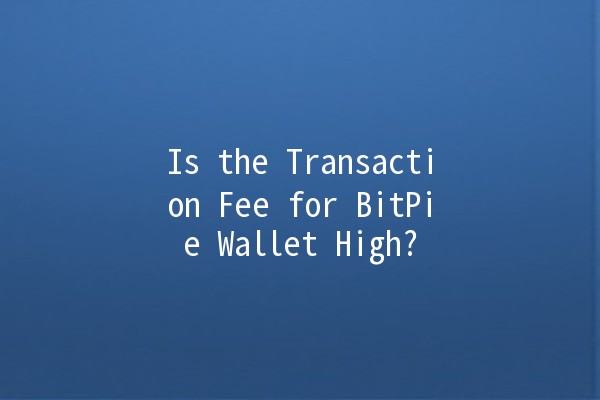




In the world of cryptocurrencies, wallet fees can have a significant impact on how users manage their assets. With the increasing popularity of cryptocurrency wallets, understanding associated transaction fees has become vital. One wallet gaining attention is the BitPie Wallet. But how high are the transaction fees for transferring funds using this wallet? This article delves into the topic, offering practical advice and tips on how to manage transaction fees effectively.
Before we explore transaction fees, it's essential to understand what BitPie Wallet offers. Launched in 2018, BitPie is a noncustodial cryptocurrency wallet, allowing users to retain full control over their private keys. Operating on multiple blockchains, BitPie supports various cryptocurrencies, making it a versatile choice for many users.
BitPie Wallet is designed to cater to both beginner and experienced cryptocurrency holders. It features a userfriendly interface, enabling easy navigation and transaction processing. Users can store, send, receive, and manage multiple crypto assets all in one place.

Transaction fees play a crucial role in cryptocurrency transactions. They are the fees paid to network miners for confirming and validating transactions. Various factors affect transaction fees, including network congestion and the type of transaction.
When it comes to BitPie, the wallet does not charge additional fees; users only pay the fees mandated by the blockchain network itself. However, understanding how these fees work allows users to make informed decisions on when to transact, potentially saving money.
To truly understand if BitPie Wallet's fees are high, we need to compare its transaction fees with other popular wallets. Generally, wallet fees can vary widely depending on network conditions. Some wellknown wallets include:
Many BitPie users report that transaction fees are comparable to those of major wallets. The lack of additional fees imposed by BitPie often leads to favorable experiences when transacting. Given the variability of fees across the cryptocurrency landscape, users should always check current fees before transacting.
Lowering transaction fees is an invaluable skill for cryptocurrency users. Below are five specific tips designed to enhance your productivity and minimize costs when using BitPie Wallet.
Tip: Monitor network congestion and choose to transact when fees are low.
Application: Use tools like blockchain explorers to gauge network activity. Scheduling transactions for offpeak hours can lead to significant savings on fees.
Tip: If applicable, utilize layer 2 solutions that offer reduced fees.
Application: Some cryptocurrencies provide secondary networks that facilitate faster and cheaper transactions. For instance, utilizing Ethereum's Layer 2 scaling solutions can drastically lower fees.
Tip: Combine smaller transactions into larger ones to reduce fees.
Application: Instead of sending multiple smaller amounts, consolidate your transfers into one larger transaction. This approach can help minimize the number of fees incurred.
Tip: Select cryptocurrencies with lower transaction fees.
Application: Some cryptocurrencies, like Cardano or Stellar, generally offer lower fees than Ethereum or Bitcoin. Transferring assets in more costeffective currencies can help to decrease overall transaction costs.
Tip: Choose standard transaction speeds instead of highpriority.
Application: Most wallets, including BitPie, allow users to adjust the speed of transaction confirmation. Opt for a standard confirmation time unless urgency is required. This choice often leads to lower fees.
No, BitPie Wallet does not impose additional fees beyond the standard network transaction fees. Users are only responsible for the fees required by the blockchain they are using.
When initiating a transaction, BitPie Wallet will provide an estimate of the network fee. Users can review this amount before confirming the transfer, allowing for informed decisions.
Yes, using blockchain explorers or specific fee estimation tools lets users gauge current network conditions. Monitoring these can help users predict future fee trends.
Yes, BitPie Wallet is a noncustodial wallet that offers a high level of security. However, always follow best practices for wallet security, such as enabling twofactor authentication.
If the fee is too low, your transaction may be delayed or even left unprocessed until network conditions improve. It’s crucial to strike a balance between cost and transaction speed.
Some cryptocurrencies supported by BitPie allow staking directly through the wallet. Check the specific terms for your cryptocurrency regarding staking availability and rewards.
In summary, understanding transaction fees for BitPie Wallet is essential for managing cryptocurrency efficiently. Fees primarily depend on network factors rather than additional charges imposed by the wallet itself. Employing practical tips to reduce costs can enhance your overall experience, making cryptocurrency transactions more manageable and costeffective.
By staying informed about market conditions and employing strategic approaches, users can facilitate smooth transactions without incurring excessive fees. Explore BitPie today and experience the benefits of a costeffective and secure cryptocurrency wallet!